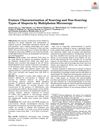Frontal Fibrosing Alopecia in Postmenopausal Women
December 2004
in “
Journal of The American Academy of Dermatology
”

TLDR Some postmenopausal women with frontal fibrosing alopecia stopped losing hair with finasteride treatment, hinting at a possible hormonal cause.
From June 2000 to July 2003, a study involving 14 postmenopausal women aged 54 to 78 diagnosed with frontal fibrosing alopecia (FFA) found that FFA is characterized by hair follicle destruction due to an inflammatory lymphocytic infiltrate, particularly affecting intermediate and vellus-like follicles. The cause of the selective follicle involvement is unclear. Some patients experienced a halt in disease progression when treated with finasteride (2.5 mg/d), suggesting a potential role of androgens in FFA's pathogenesis, although the small sample size limits the statistical significance of this finding. FFA is distinct from lichen planus pilaris (LPP) due to its selective follicle involvement and may be related to fibrosing alopecia in a pattern distribution (FAPD), which also suggests androgens could be involved. However, the hormonal basis of FFA has not been definitively established.














